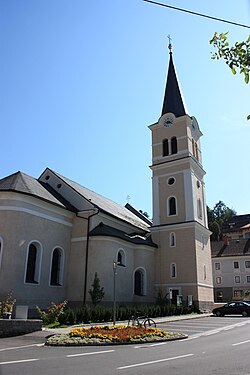Paternion
| Paternion | ||
|---|---|---|

St. Paternian Church
|
||
|
||
| Location within Austria | ||
| Coordinates: 46°43′N 13°38′E / 46.717°N 13.633°ECoordinates: 46°43′N 13°38′E / 46.717°N 13.633°E | ||
| Country | Austria | |
| State | Carinthia | |
| District | Villach-Land | |
| Government | ||
| • Mayor | Alfons Arnold (SPÖ) | |
| Area | ||
| • Total | 105.5 km2 (40.7 sq mi) | |
| Elevation | 519 m (1,703 ft) | |
| Population (1 January 2016) | ||
| • Total | 5,877 | |
| • Density | 56/km2 (140/sq mi) | |
| Time zone | CET (UTC+1) | |
| • Summer (DST) | CEST (UTC+2) | |
| Postal code | 9711 | |
| Area code | 04245 | |
| Website | www.paternion.at | |
Paternion (Slovene: Špaterjan) is a market town in the district of Villach-Land in the Austrian state of Carinthia. It is located within the Drava valley about 18 kilometres (11 mi) in the north-west of the city of Villach.
Paternion is subdivided into six Katastralgemeinden: Feistritz an der Drau, Kamering, Kreuzen, Nikelsdorf, Paternion and Rubland.
Settled since the Hallstatt culture, the place was first mentioned as St. Paternianus in a 1296 deed, named after Saint Paternian, the Bishop of Fano, as the area south of the Drava then belonged to the Patriarchate of Aquileia. In 1530 Paternion received market rights from Archduke Ferdinand I of Austria. With a percentage of about 30%, the municipality is today one of the centres of Protestantism in Carinthia.
Seats in the municipal assembly (Gemeinderat) as of 2009[update] elections:
...
Wikipedia


